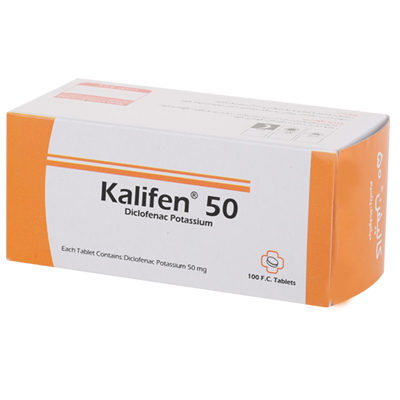Description
Diclofenac potassium tablets are a type of nonsteroidal anti-inflammatory drug (NSAID) that is used to reduce pain and inflammation. This medication is especially used to treat muscle and joint pain, migraine headaches, menstrual cramps, and pain caused by minor surgeries or sports injuries.
Diclofenac potassium works by inhibiting the production of certain chemicals in the body called prostaglandins, which are involved in causing pain and inflammation. This medication is taken orally and has a faster absorption rate than diclofenac sodium, which allows it to provide faster relief.
Also, this medicine is preferable for patients with high blood pressure because it contains potassium salt compared to diclofenac sodium, which causes high blood pressure. This medicine is produced under the brand name Kalifen in the Kish Medipharm pharmaceutical group in 50 mg. It is always better to take this medicine under the supervision of a doctor and in the appropriate dosage.
Uses of Diclofenac Potassium Tablets (Califen)
The active ingredient diclofenac is an FDA-approved drug used in the treatment and management of acute and chronic pain associated with inflammatory conditions, especially pain related to the musculoskeletal system. The uses and prescriptions of diclofenac potassium tablets are as follows:
- Acute migraine
- Osteoarthritis
- Rheumatoid arthritis
- Ankylosing spondylitis
- Muscle pain and injuries
- Dysmenorrhea and menstrual pain
- Mild to moderate pain and inflammation caused by various conditions such as headaches, toothaches, etc.
Take diclofenac potassium (Califen) by mouth as directed by your doctor, usually 2 to 4 times daily. The dosage of this medication is determined by your doctor based on your medical condition, physical examination, clinical observations, needed tests, response to treatment, and other medications you may be taking.
The recommended dose of diclofenac potassium (Califen) tablets for the treatment of menstrual pain or primary dysmenorrhea is 50 mg per day. Physicians may find, with experience, that in some patients an initial dose of 100 mg of diclofenac potassium tablets followed by 50 mg doses provides better relief.
For relief of osteoarthritis, the recommended dose is 100 to 150 mg of diclofenac potassium (Califen) tablets per day in divided doses, as 50 mg 2 or 3 times a day. For relief of rheumatoid arthritis, the recommended dose is 150 to 200 mg per day in divided doses, as 50 mg 3 or 4 times a day.
To reduce the risk of stomach bleeding and other side effects, take diclofenac potassium (Califen) at the lowest effective dose for the shortest possible time under the supervision of a qualified healthcare professional. Do not increase the dose without consulting your doctor or pharmacist, or take this medication for longer than prescribed.
In certain conditions (such as arthritis), it may take up to 2 weeks of regular use of Califen before you experience its full benefits. If you are taking this medication as needed, remember that pain relievers and anti-inflammatory medications work best when:
Contraindications for Diclofenac Potassium Tablets (Califen)
- Other selective COX-2 inhibitors, diclofenac, are contraindicated in patients with a history of cardiovascular disease such as MI or stroke.
- Diclofenac potassium tablets should not be used in coronary artery bypass surgery due to the high risk of MI and stroke.
- Diclofenac should be avoided in elderly patients due to possible adverse effects related to the cardiovascular system and gastrointestinal tract.
- This drug is also contraindicated in patients with a history of anaphylactoid reactions to NSAIDs.
- Diclofenac potassium tablets should not be given to patients who have experienced asthma, hives, or allergic reactions after taking aspirin or other NSAIDs.
- Diclofenac potassium tablets are also contraindicated in patients with mild or severe renal failure due to the potential negative effects of decreased renal perfusion.
- Diclofenac or other NSAIDs should not be used in patients with a history of gastrointestinal bleeding or ulcers.
- Special monitoring is also important in patients with a history of Helicobacter pylori infection.
Drug interactions of diclofenac potassium tablets (Califen)
Drug interactions may change how your medications work or increase your risk of serious side effects. Diclofenac potassium tablets are no exception. So keep a list of all the products you use (including prescription and nonprescription drugs and herbal products) and share it with your doctor and pharmacist. Do not start, stop, or change the dosage of any medicines without your doctor's approval. Some products that may interact with diclofenac potassium tablets (Califen) include:
- Lithium
- Aliskiren
- Cidofovir
- Methotrexate
- Diuretics (such as furosemide)
- ACE inhibitors (such as benazepril, lisinopril)
- Corticosteroids (such as dexamethasone, prednisolone)
- Angiotensin II receptor blockers (such as losartan, valsartan)
Diclofenac potassium (Califen) tablets may increase the risk of bleeding if taken with other medications that may also cause bleeding, such as clopidogrel, enoxaparin, and warfarin.
Check all prescription and over-the-counter medicine labels carefully because many medications contain pain relievers or fever reducers (aspirin, NSAIDs such as ibuprofen, ketorolac, naproxen). These medications are similar to diclofenac potassium tablets and may increase the risk of side effects if taken together.
However, if your doctor has told you to take aspirin to prevent a heart attack or stroke, you are allowed to use the two medications together unless your doctor determines that this is not necessary.
Side effects of diclofenac potassium (Califen) tablets
Remember that diclofenac potassium or Kalifen tablets have been prescribed because your doctor has judged that the benefit to you is greater than the side effects. Many people using this medication do not have serious side effects.
Stomach upset, nausea, heartburn, diarrhea, constipation, bloating, headache, drowsiness, dizziness, or blurred vision may occur while taking diclofenac potassium. If any of these effects persist or worsen, tell your doctor or pharmacist promptly. Diclofenac potassium may also increase your blood pressure. Check your blood pressure regularly and tell your doctor if the results are high.
Tell your doctor right away if you have any serious side effects, including: hearing changes (such as ringing in the ears), mental/mood changes, easy bleeding or bruising, difficult or painful swallowing, signs of kidney problems (such as change in the amount of urine, pink or bloody urine), signs of heart failure (such as swollen ankles, unusual tiredness, sudden unusual weight gain).
Diclofenac potassium tablets may rarely cause serious liver disease. Call your doctor right away if you have symptoms of liver damage, including: nausea or vomiting that doesn't stop, loss of appetite, stomach or abdominal pain, yellowing of the eyes or skin, dark urine.
Very serious allergic reactions to this drug are rare. However, seek immediate medical attention if you notice any symptoms of a serious allergic reaction, including fever, swollen lymph nodes, rash, itching or swelling (especially of the face/tongue/throat), severe dizziness, trouble breathing, etc. If you notice other effects not listed above, contact your doctor or pharmacist.
Remember that although medicines are produced and prescribed to reduce, prevent and treat pain and problems, you should pay utmost attention to important points during and before taking them. If your doctor recommends Diclofenac Potassium tablets after examining your condition, be sure to explain your health condition to him/her completely and read the brochure inside the Califen box. We will mention some of the most common important points below:
- Take this medicinal product with a full glass of water.
- Do not lie down for at least 10 minutes after taking diclofenac potassium tablets.
- If stomach upset occurs while taking this medication, take it with food, milk, or an antacid.
Conclusion
As mentioned, diclofenac potassium tablets can effectively reduce and relieve pain and inflammation in the body due to its anti-inflammatory and analgesic effects. However, like all NSAIDs, long-term use or high doses may cause side effects such as damage to the stomach, kidneys, and heart. Therefore, it should be taken under the supervision of a doctor and the instructions for use should be followed carefully.
Diclofenac potassium tablets temporarily improve symptoms and pain, but do not treat the underlying cause of the disease, and the disease should be investigated and treated by a specialist and treating physician. Overall, diclofenac potassium is an effective option for controlling pain and inflammation, but caution is necessary in its use, as with any other medication.
Remember that all the explanations provided are intended to increase public awareness and should not be used as a substitute for medical advice.



Reviews
There are no reviews yet.